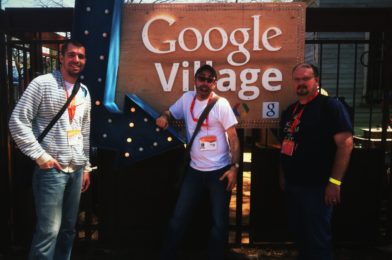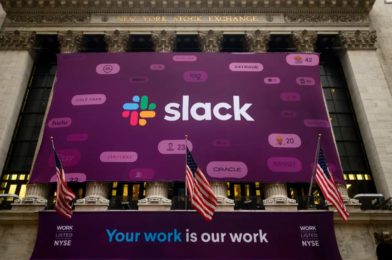After 10 years of the hustle and grind, you can say I had “made it.”
Fortune 500 companies. Mergers and acquisitions. Running some of the largest consumer websites in the world. Making the top of the Inc. 5,000 list.
Everyone talks about getting “there”—to your goal, the top of your own personal, proverbial ladder. But I’ve noticed, nobody really talks about what happens once you are there.
Burnout, exhaustion, and to top it all off you find that you don’t have much privacy anymore. Everyone knows your story.
So, for my own mental health, I decided to do something kinda crazy…
I closed my LinkedIn account.
Instead, I exported my LinkedIn contacts, filtered the ones that were most important to me—the ones I wanted to stay in contact with, and created a monthly newsletter.
Five months in, I can easily say I have had an amazing experience and an incredible response. Lately, I’ve found myself looking back over the last few emails and I’ve noticed a few things that have inspired me to maybe leave my Linked-In account closed…
Digital Privacy
My biggest realization was that my entire life has been on display and up for sale to the highest bidder for the last 10 years on LinkedIn. That might have been something I was comfortable with for a season, but at some point, I found that I just wanted more privacy.
Ever since Microsoft acquired LinkedIn, I have seen more advertising on the platform and even more violations of my privacy. Not the least of which is LinkedIn faking genuine messages through their sponsored “InMail” product.
I was getting roughly 10 inbox messages and 25 connection requests per day. 99% of them were spam. The freedom in only getting direct communication from a select few people I care about connecting with is refreshing, to stay the least. It frees up space in my mind to actually have a personal, impactful connection with people I know will impact me in return.
Powerful Networking
You would be surprised to find out I have had three times the number of job offers since leaving LinkedIn and 10 times the number of incredible conversations.
Now, I’m not currently looking for a job, but I know that is the reason why many people are on LinkedIn. What I can tell you is that your next job will probably come from someone you already know, not a social network. A personal email does so much more to create a profound impact and build relationships than an impersonal social post—even if it’s a direct message.
The powerful thing about email is that if someone forwards your email, the other person is more likely to see it. Social media is now controlled by algorithms that largely surpass organic content—they even timeout and disappear. When you send a story link on Instagram or Facebook thinking the content will help someone grow or inspire something, that link will eventually timeout and the person you initially send the message to may never see it. That opportunity to impact someone’s life or business vanishes.
Adding Value
The big problem I find with social media is that so much of what is being posted online does not actually add value. Especially in this pandemic, there’s been an influx of new content—people creating content simply for entertainment rather than for growth. There’s nothing wrong with entertainment—we’re all struggling right now and need a smile every now and then—but where is the actual value, the personal connection?
The newsletter allows me to process how I can add something of value to someone else’s life. It’s not posting to hundreds of thousands of people at once, it’s the initial gambit of a 1::1 conversation with another person. I’m aware of both the importance of that action and the intrinsic value of the place that I take up in someone else’s inbox.
Genuine Conversations
Do you remember the old days when Facebook was new and LinkedIn was a novelty? At the advent of social media most platforms started out as a series of incredible back-and-forth conversations. They were an online facilitation of a never-ending networking event. In recent years, with the influx of the influencer culture, social media as a whole has devolved into quick sound bites, sophisticated algorithms, and, unfortunately, trolls.
The followers I had? I don’t own their time or even a place on their feed. Those highly-coveted spots are controlled by an algorithm that only maybe understands what they want and is regulated by fickle elements completely outside of their control or mine.
However, every month with the newsletter presents an opportunity to begin an incredible two-way conversation with each individual person my network—all in the privacy of my inbox. I don’t have an algorithm that suppresses my content to only 10% of my followers—100% of the folks I send the email to get a chance to read it. Every single person on my list gets the opportunity to hear what I have to say—and hopefully experience a little growth in the process.
That inbox real estate is golden to me. A golden opportunity to have a personal conversation about something more important than what I ate for lunch or wore to work today—that adds no value to your day or your business. I would much rather have an impactful conversation that allows you to learn something new, experience a new viewpoint, and take that growth to your business and to the marketplace.
Mindful Thinking
Posting to social media has largely become reactive. For most, posting is rooted in emotions and reacting to current events. The Black Lives Matter movement and the Coronavirus pandemic both showed this in one very large, very reactive capsule. In the midst of two congruent media frenzies, so many people ran headlong into saying something tone-deaf, inappropriate, insensitive, and flat out racist because they didn’t stop to think.
With social media, there is a level of anonymity that seems to go hand-in-hand with a post (even if there is a name attached to an account). There’s a kind of distance that seems to give people the license to say whatever they want without accepting the responsibility for what they say. Recent events have disputed that and many people found themselves immediately held accountable for the things they said.
The monthly newsletter forces me to be mindful and proactive. To gather my thoughts before posting anything, and to edit and re-edit to make sure I’m saying not just what I want to say, but what will actually add to the conversation at hand and benefit my readers who aren’t just my audience—they’re my friends.
My June newsletter about how to have vulnerable conversations in the midst of the Black Lives Matter movement allowed me to have more candid conversations than I would ever be able to on a social media platform. I saw more engagement than ever before because people needed to have a conversation about how they felt and ask questions from someone who was willing to listen and ready to talk, not hear yet another sound byte.
Final Thoughts
All in all, I’ve found not only value, I’ve found new friends and more opportunities than ever before—not just in business, but personally. More opportunities to mentor, more opportunities to have impactful conversations, all from one email.
Now, I’m not saying you should do this, but…maybe you should?
What I am saying is that it’s time for a social media evaluation of your own. What are you putting into the world? What could change in your life if you removed this one thing from your plate?
How much time would you free up? How much more would you be able to do? How many more purposeful, personally engaging conversations would you be able to have?
If this post is a surprise to you because you’ve enjoyed my blog and found value in my posts, I’m grateful for your time and I’m so sorry you’ll miss it. However, you can sign up to receive The Inner Circle where I’ll be from now on. I promise to only drop into your inbox once a month with valuable thoughts about business, investing, and career growth.
If you haven’t guessed it by this post, more than anything, I value deep relationships. The newsletter lets us have a deeper conversation that leads to meaningful connections. I’d love for this to be the start of a conversation between you and me, so I’ll see you in The Inner Circle.

